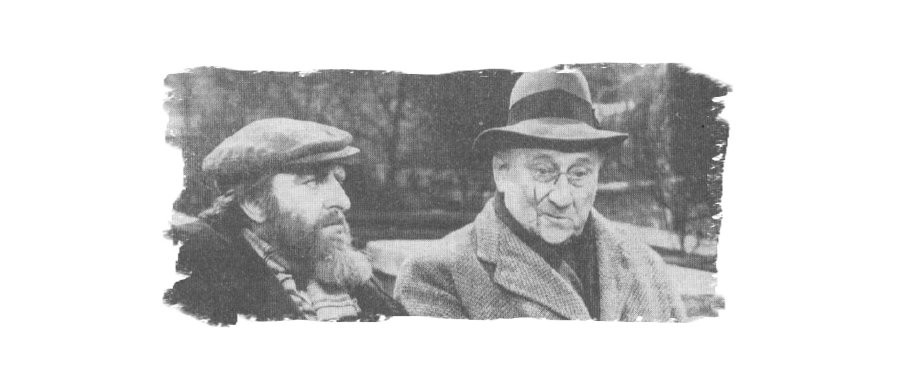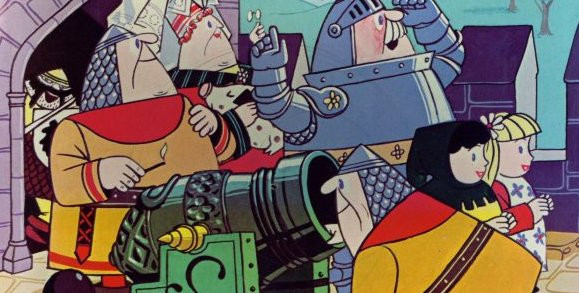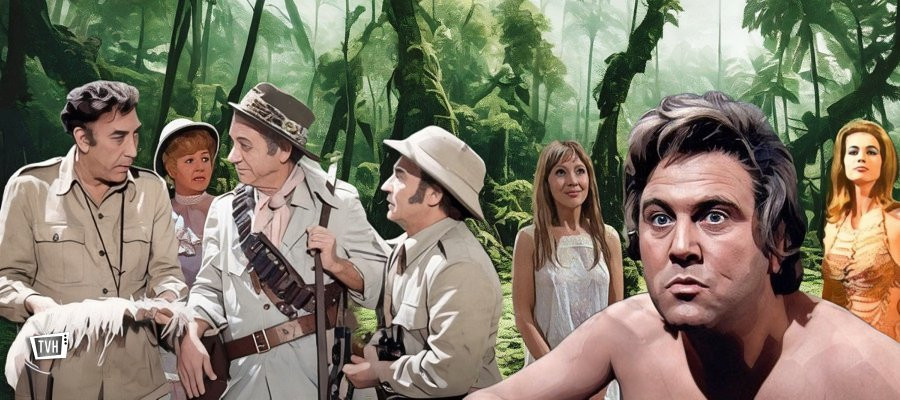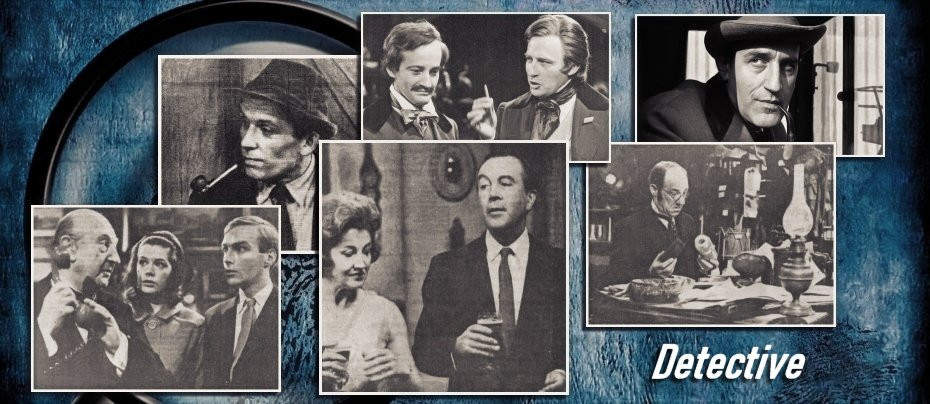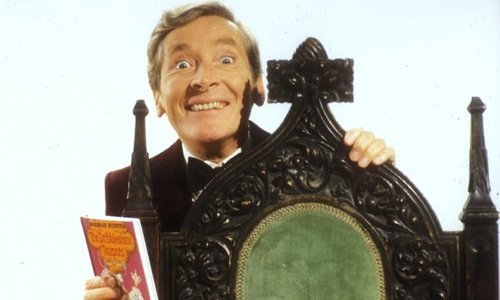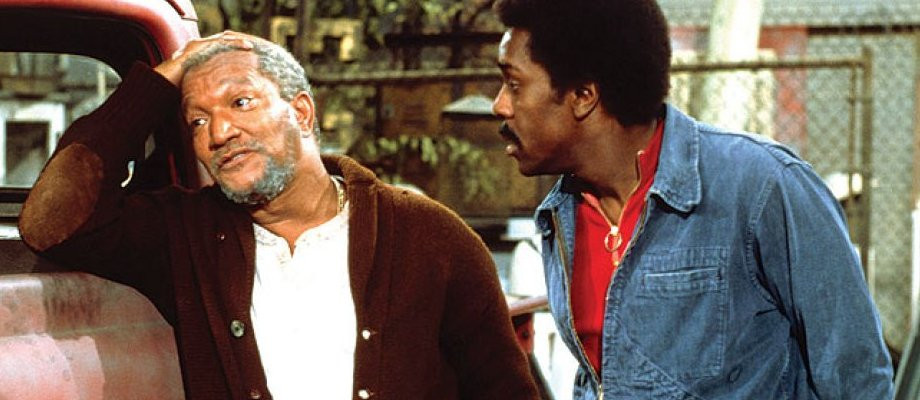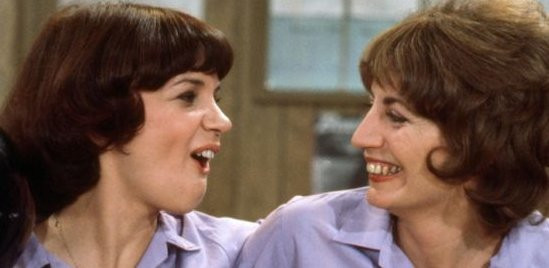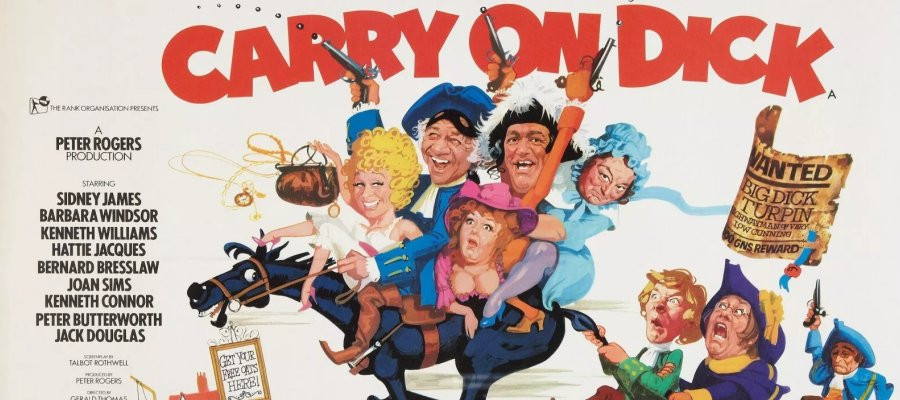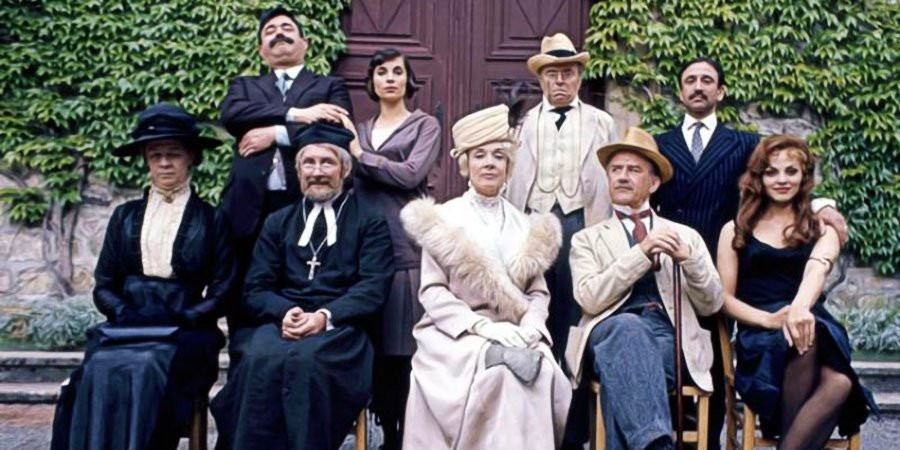
Clochemerle
1972 - Uk Germany"If you leave Paris and drive south along the Route Nationale number 6 down the Valley of the Saône, through the vineyards of Burgundy towards Lyon, you will pass the town of Belleville-sur-Saône. And if you turn right there instead of rushing on to the Riviera, as most people do, you will find yourself in one of the most beautiful corners of France. The land of the Beaujolais. It is here on these remote sunny slopes and in the deep cool valleys that some of the finest wine in France is produced. And has been for the last 900 years. And during that time dozens of tiny villages dotted about the hillsides have mercifully escaped the advantages of modern civilisation. Especially the village of Clochmerle. And this was the little village devoted to the growing, making, and drinking of its admirable wine, that was the cause of one of the biggest scandals ever to happen in France, and that was to have repercussions on the lives of people throughout the world." (Introduction to Clochemerle - BBC 1972)
Based on the classic 1934 satirical novel by Gabriel Chevallier, which received considerable public acclaim and has since been translated into twenty-six languages and sold several million copies, Clochemerle was dramatised first in a 1947 film by Pierre Chenal, and when the BBC approached the celebrated scriptwriters Alan Simpson and Ray Galton (Hancock / Steptoe & Son / Comedy Playhouse) in 1969 asking if they had any ideas for a series, the writing partners remembered a small 'fleapit' of a cinema they had visited in 1951 in Sutton, Surrey, and the low-budget film that had captured their imagination. "At that time we were in love with all things French. The newly discovered world of wine, haute cuisine, the country, the language, and above all, cinema. The marvellous comedies of Jacques Tati, Fernandel, Raimu, Bourvil, Et les autres."
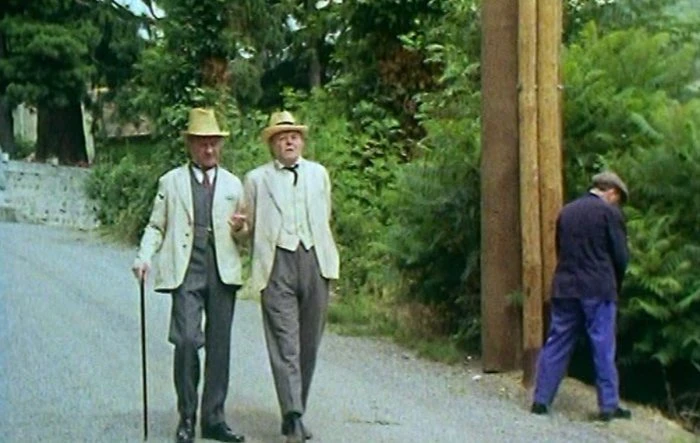
The story centres on personal rivalries and local politics in a fictional village (inspired by Vaux-en-Beaujolais, in Beaujolais in 1923 and where an imaginary coat of arms for Clochemerle was inaugurated by Gabriel Chevallier in 1956 whilst giving his name to the old main street) and satirises the conflict between Catholics and republicans in the Third Republic which are exacerbated when the Mayor of Clochemerle orders the construction of a vespasienne (public urinal) almost on the doorstep of the village church.

The Mayor of Clochemerle, Barthelemy Piechut (Cyril Cusack), the principal wine grower of the district, departmental councillor and, if all his plans are realised, a future senator of France, has already made his mind up that in order to further his career he needs to make a statement by leaving behind a monument to his administration's achievements. His right-hand man is a staunch left-wing member of the Republican Party (and therefore, an enemy of the Church and of the aristocracy) Ernest Tafardel (Kenneth Griffith), schoolmaster, town clerk, whose main asset to Piechut is his intolerable breath. An unhappy affliction used to great advantage by the Mayor. Whenever he wishes to obtain approval of the opposition to his policies, he sends Tafardel to argue the case. In order to close the schoolteacher's mouth, they will quickly give their consent.

Among the villagers are the Girodots, a family headed by Hyacinthe Girodot (Wolfe Morris), a solicitor and notary who has grown fat on the misfortune of others. Three generations of carefully chosen marriages and manipulation of the law has produced the richest and ugliest family of Clochemerle. Therefore, it is a constant source of amazement how two such people could have produced the lovely Hortense (Madeline Smith). As local physician Doctor Mouraille (Peter Madden) observes, "One can only assume the family chromosomes finally rebelled at producing such ugliness."
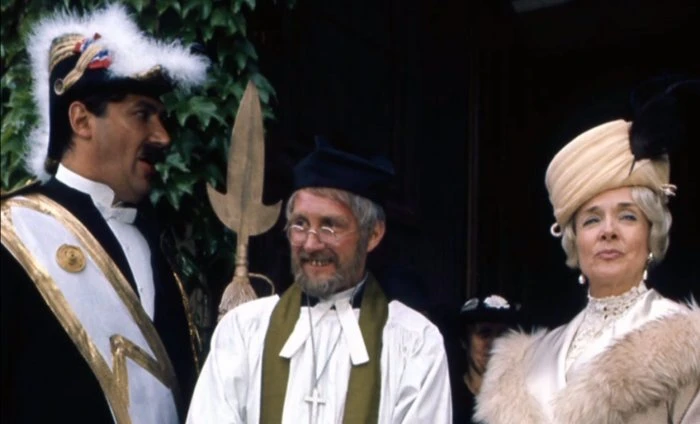
The Baroness Alphosine de Courtebiche d'Eychaidailles Grenoble (Micheline Presle), a descendent of one of Louis XI mistresses, has flatly refused to accept the French Revolution and treats all and sundry as being below her. Even the local priest, the Curé Ponosse (Roy Dotrice), is treated as one of her servants. The Baroness is definitely in mind when Tafardel is dispatched by the Mayor to break the news of the urinal to the villagers, which he takes great joy in doing seeing the move as a “death blow to the little that remains of the prestige of the nobility.”
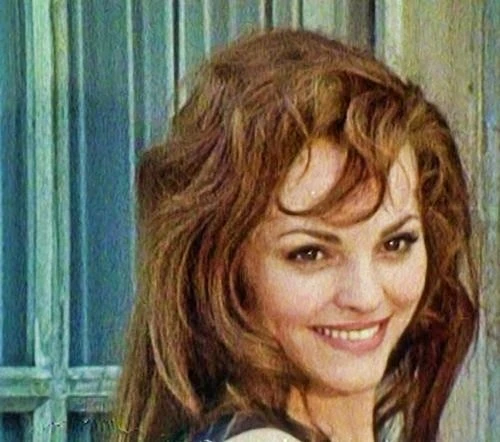
Other villagers include Judith Toumignon (Catherine Rouvel), the sexual fantasy of all able-bodied men in the village, despite the fact that she is married to the owner of the Beaujolais stores, the one place in Clochmerle where the men insist on doing the shopping. Her husband, Francois Toumignon (Freddie Earlle) is the champion drinker of Clochemerle which takes him away from his store and his home on any number of days and nights a week, much to the joy of Judith who can then indulge in her love affair with the much younger Hippolyte Foncimagne (Christian Roberts), clerk to Justice of the Peace and Francois' best friend. The only person in the entire village who is ignorant of this fact is Francois who is convinced his wife is frigid, and in a drunken outburst even offers to stand Hippolyte as much drink as he can drink to thaw his iceberg of a wife.
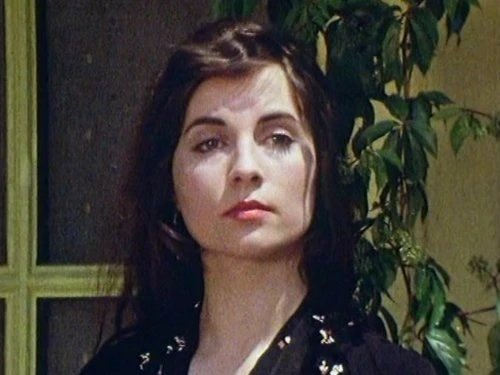
Directly across the street from the Toumignons is Adele Torbayon (Cyd Hayman), the innkeeper’s wife. A rival in stunning attractiveness to Judith. The two women are deadly rivals. Neither of these women would be welcome in the home of Mademoiselle Justine Putet (Wendy Hiller), spinster, virgin and manhater, who is President of the Churchwoman's Guild and guardian of the town's morals who will come to describe the edifice as “a monument to the devil.”
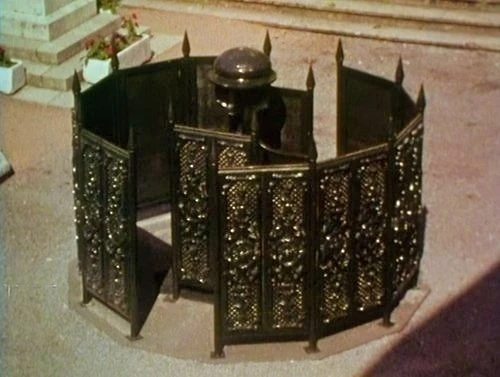
The day arrives and the urinal is unveiled in a civic service full of pomp and ceremony attended by civic dignitaries from each department as well as Clochemerle's most famous son, Alexandre Bourdillat (Hugh Griffith), the ex-Minister of Agriculture, and Aristide Focart (Aubrey Woods), the Member of Parliament for the district. Two of the most deadliest rivals in the republican party, a fact that the Mayor uses to his own advantage as he cunningly plays one off against the other.

Once established, the urinal becomes the focal point for Mlle Putet’s crusade against moral principles. An object of scandal and corruption determining it the duty of all good Catholics to unite and ensure its destruction. When the local youths discover Mlle Putet’s objections they take it upon themselves to stand outside her window and expose themselves to her. This is the catalyst for her campaign to begin in earnest. Garnering support from the pious women of the town, she embarks on a crusade to have the urinal removed.
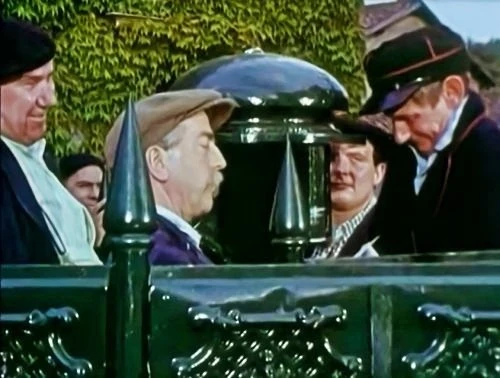
Following a series of violent outbreaks, which include the bombing of the urinal, civil unrest breaks out in Clochmerle, necessitating first the Archbishop of Lyon (Raymond Gérôme) and then the Ministere De L'Interieur (Dennis Price) to become involved, with all parties having their own vested and yet opposing interest in a resolution. A report file is created which is then passed down from one department to the next until it eventually reaches the most non-descript department at the Ministry where a decision needs to be made between setting up a government commission or sending in the police. Eventually a choice between the two is made by throwing two darts at a board. Nearest the bull being the decider!

Eventually, and because the Prefect of the Rhone (Charles Lloyd Pack) is nearing election year and doesn’t want to commit to anything controversial, the military that are sent to Clochmerle on the pretence that they are on manoeuvres. This seriously backfires and culminates in a pitched battle between the villagers and the French Army, resulting in the sacking of the French Minister for the Interior and bringing matters to a head where even the President of France (Aram Stephan) becomes involved, which is unfortunate because he is at a disarmament conference in Geneva with other nations when he decides to leave and return home. Had he stayed, we are told, the Second World War might never have taken place.

Before leaving Geneva, the President summons Mayor Piechut to a summit meeting at the Elysée Palace in Paris where his cunning plan reaches fruition and his rise to power is finally realised.
In its satirical portraits of individual inhabitants, Clochemerle is an example of observational humour that revels in the religious contradictions and the clever, witty social commentary of the author. Visually stunning it is unfortunate that the only version released on DVD is of a poor and grainy quality, but it does not detract from excellence of the cast, the bravado and joie de vivre of the marvellous adaptation by Galton and Simpson which is glued together with Peter Ustinov's gentle, mocking commentary.
The show was made as a co-production between Britain's BBC and West Germany's Bavaria Film and was shot on location in Colombier-le-Vieux, in the department of Ardèche, south of Lyon. The steam railway there, which appears in the programme, had been restored by enthusiasts the year before shooting and can still be ridden by tourists in today. The recently restored Château de Bellecombe and the beautiful 16th century Ruissas fortified house are representatives of remarkable stately architecture.
Chevallier subsequently wrote two sequels to the work after the Second World War entitled Clochemerle Babylone (1951) and Clochemerle-les-Bains (1963). The term Clochemerle has entered French as a term to describe "petty, parochial squabbling" whilst the term clochemerlesque has similar usage. More in the vain of The Darling Buds of May than ‘Allo, ‘Allo, (with mercifully no cod French accents) Clochmerle the BBC series, due to its period setting, has not dated in the 50 years since its first release and is a fine example of gentle comedy at its very best.
Seen this show? How do you rate it?
Seen this show? How do you rate it?
Published on December 20th, 2021. Written by Marc Saul for Television Heaven.



